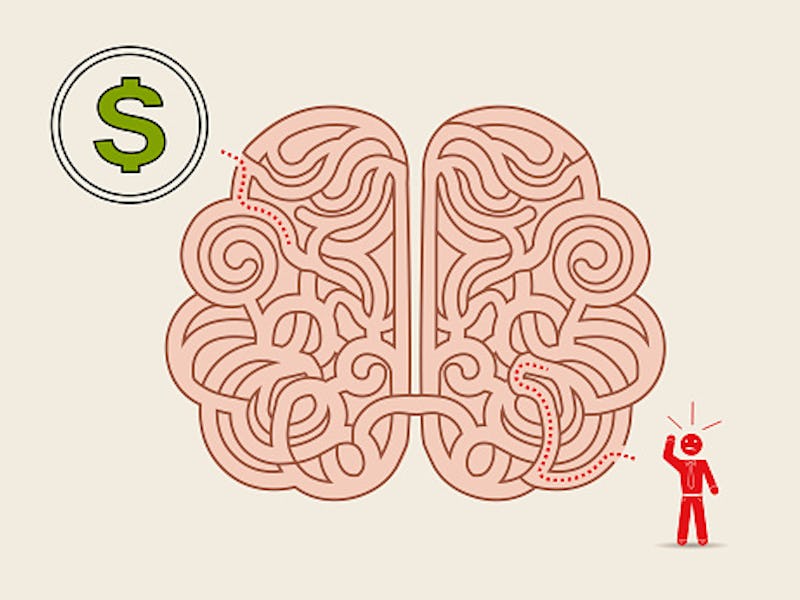There's a counterintuitive link between social status and health -- study
Mental wealth can benefit mental health.

Money can’t always buy good health, but studies do suggest that finances have an effect on one’s well-being. Recently researchers redetermined that link but with a twist: They discovered that it’s how wealthy one thinks their family is that determines their mental health, not necessarily how much money their family actually has.
The study, published this week in the journal Proceedings of the National Academy of Sciences, analyzed data from thousands of twins to see how this phenomenon, sometimes called the “status syndrome”, occurs in and outside families.
In the study, the member of a twin pair that gave their family a higher financial ranking was, on average, determined to be less depressed and anxious, less likely to use marijuana, and less likely to be convicted of a crime, compared to the twin who gave their family a lower ranking. The boosted health outcomes occurred even when a twin’s perception of their family didn’t match their actual financial reality.
To reach this conclusion, the research team followed 2,223 twins born between 1994 and 1995 in England and Wales — all participants in the Environmental Risk Longitudinal Twin Study.
The wealth “ladder”
For the past two decades, researchers tracked the twins and compared how their varying social perceptions linked to indicators of health and well-being. These indicators included rates of depression, anxiety, substance use, level of education, and crime.
They utilized a variety of methods — individual, parent and teacher reports, administrative records, standardized cognitive testing, and biological testing — to capture participant’s health outcomes and perceptions.
Perceived wealth influenced mental health more than actual wealth.
At ages 12 and 18, participants ranked their family’s social status relative to other families across the United Kingdom. They placed their family on a hypothetical ladder with five rungs representing the distribution of wealth — rung one stood for “poor” and rung five stood for “rich”. The exercise was designed to capture adolescents’ perception of their family’s financial hardship or ease relative to others.
The team found that even twins — who grow up in the same family — can have drastically different views on their family’s finances. In turn, these contrasting views can influence the state of their mental health.
Higher social status, better mental health
By age eighteen, twins who rated their family as having lower social status — and in turn, less wealth — were more likely than their co-twin to be convicted of a crime, be unemployed, have lower educational attainment, and have poorer mental health. Perceived social status influenced their mental health more than their actual social status, or previous mental health challenges.
Although the twins increasingly gained a better understanding of their family’s actual financial reality as they got older, the link between their perceived social status in relation to others to their mental health became evident after the age of 14. By 18, that perceived status had an acute effect on mental health.
It’s possible that the “status syndrome” may be occurring because of reverse causation: Anxious teenagers or those who have been convicted of a crime might rank their families lower on the social ladder than non-anxious people or those who haven’t encountered the justice system. More large-scale studies are needed to see what happens first — worsened mental health or poor perceptions of family social status.
Abstract:
Children from lower-income households are at increased risk for poor health, educational failure, and behavioral problems. This social gradient is one of the most reproduced findings in health and social science. How people view their position in social hierarchies also signals poor health. However, when adolescents’ views of their social position begin to independently relate to well-being is cur- rently unknown. A cotwin design was leveraged to test whether adolescents with identical family backgrounds, but who viewed their family’s social status as higher than their same-aged and sex sibling, experienced better well-being in early and late adolescence. Participants were members of the Environmental Risk Longitudinal Twin Study, a representative cohort of British twins (n = 2,232) followed across the first 2 decades of life. By late adolescence, perceptions of subjective family social status (SFSS) robustly corre- lated with multiple indicators of health and well-being, including depression; anxiety; conduct problems; marijuana use; optimism; not in education, employment, or training (NEET) status; and crime. Findings held controlling for objective socioeconomic status both statistically and by cotwin design after accounting for measures of childhood intelligence (IQ), negative affect, and prior mental health risk and when self-report, informant report, and administra- tive data were used. Little support was found for the biological embedding of adolescents’ perceptions of familial social status as indexed by inflammatory biomarkers or cognitive tests in late ado- lescence or for SFSS in early adolescence as a robust correlate of well-being or predictor of future problems. Future experimental studies are required to test whether altering adolescents’ subjective social status will lead to improved well-being and social mobility.